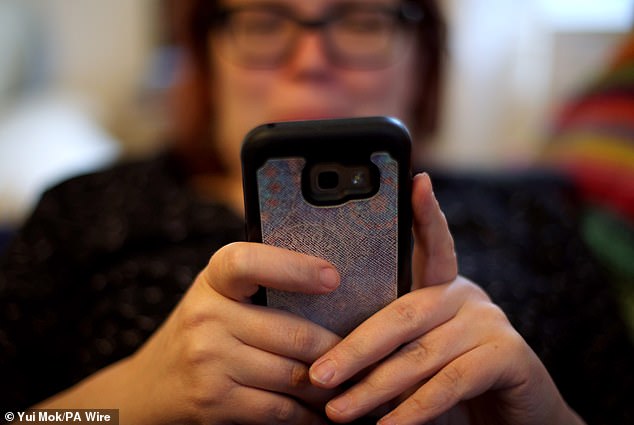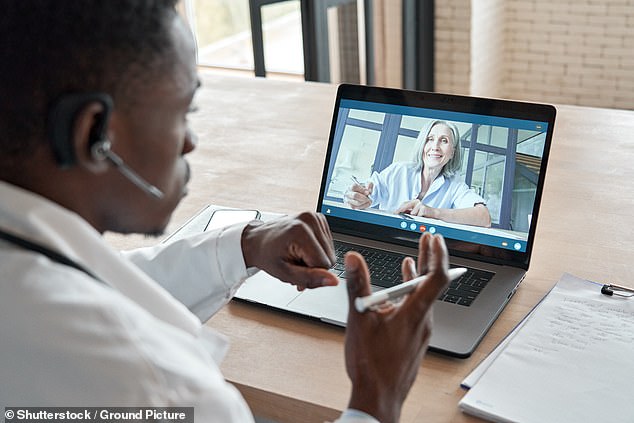The proportion of GP appointments made online or by video has hit a record high despite concerns about patient safety, official figures reveal.
The rate has quintupled in just over a year, from one in 100 consultations in May 2023 to one in 20 in August this year, according to NHS England.
Patient groups warn that the push for remote care may deter some people from seeking help and risks serious illnesses such as cancer being missed.
Older people who feel uncomfortable disclosing personal medical problems over the internet may be more likely to suffer, campaign group Silver Voices added.
The rate of virtual GP appointments has quintupled in just over a year, from one in 100 consultations in May 2023 to one in 20 in August this year, according to NHS England.
The proportion of GP appointments made by video or online has risen steadily for much of the last year and a half, topping 1 per cent in May 2023, 2 per cent in August and 3 per cent in December.
It reached 4 percent in March this year and stood at 5.2 percent in August, the first time it has exceeded 5 percent.
The rise in appointments made by video or online has coincided with a drop in the proportion of face-to-face consultations, a trend that accelerated with the pandemic.
Around 70.8 percent of GP appointments were made in person in October 2023, but in August this year this figure fell to 64.8 percent, the lowest figure since June 2022.
The proportion of appointments made by telephone was 26.1 per cent in August and has remained stable at around 26 per cent for much of the last 12 months.
Comparable data for GP appointments in England starts in March 2022.
Doctors said remote consultations are “often more convenient” for patients, but they work to ensure requests for face-to-face appointments are honored.
However, Dennis Reed, director of Silver Voices, which campaigns for over-60s, said: “We have long warned about the risks of remote dating.

The proportion of GP appointments made by video or online has risen steadily for much of the last year and a half, topping 1 per cent in May 2023, 2 per cent in August and 3 per cent in December.
‘They may be easier and preferable for GPs, but they may deter some older people from receiving care or affect the quality of care they receive.
‘A GP doing a remote appointment can’t see the way a patient walks into the room or grimaces when they sit down. They cannot perform a physical exam, check your blood pressure or heartbeat.
‘And patients may be reluctant to describe symptoms online as they would if they were face to face due to privacy concerns.
‘This can lead to symptoms being hidden and serious illnesses being overlooked and worsening.
“GPs should give patients the chance to choose the type of consultation they prefer, but we know from our members that this does not always happen.”

Older people who feel uncomfortable disclosing personal medical problems over the internet may be more likely to suffer, campaigners say.
Dr Rachel Ward, GP and member of campaign group Rebuild General Practice, said: ‘GPs are seeing more patients than ever – they provided a total of 27.6 million appointments in August alone.
‘We have been sounding the alarm for years, saying that the profession needs to retain its GPs, receive fairer funding and have greater autonomy.
‘When we can offer online appointments and, more importantly, when patients themselves want them, we will do so.
‘This is often more convenient for our patients and allows us to see all patients more quickly and efficiently.
‘For those patients who need or request an in-person appointment, we ensure that this is respected and that patients receive the care they want and deserve.
“The crux of the matter is not online appointments, but having enough GPs to start with.”
Professor Kamila Hawthorne, president of the Royal College of GPs (RCGP), also backed a “mixed method approach”.
He added: “This should be a decision made between the patient and the doctor.”
‘Many patients prefer the convenience and flexibility that remote consultations, whether by telephone or video, can offer, and evidence has also shown that in the vast majority of cases, remote care is safe.
‘However, we also know that many patients prefer to access care in person and this is how the vast majority of consultations in general practice are carried out.
“In many cases, GPs may initially consult with a patient remotely and then ask them to come to their consultation if they need to see them in person.”
A Department of Health and Social Care spokesperson said: “Patients who prefer a face-to-face appointment should have one and we are also committed to moving from analogue to digital care, including offering patients digital appointments whenever and wherever they want. need.”
“We will bring back primary care, shifting the focus from hospitals to the community, fixing the front door of the NHS and ending the misery of people who cannot get a GP appointment.”

